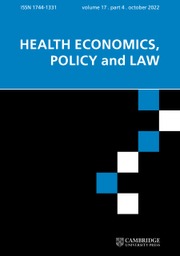Article contents
When do people choose to be informed? Predictors of information-seeking in the choice of primary care provider in Sweden
Published online by Cambridge University Press: 03 August 2018
Abstract
Improving the ability of patients to make informed choices of health care provider can give providers more incentive to compete based on quality. Still, it is not evident to what extent and when people search for information when choosing a provider. The aim of this study is to identify under what circumstances individuals seek information when choosing a primary care provider. Research to date has mostly focused on individuals’ demographic and socio-economic characteristics and the poor availability of information as barriers to information-seeking and use. Our results highlight the importance of taking individuals’ personal motivations and situational context into account when studying information-seeking behavior. Overall, these results suggest that not even individuals who are likely to search for information since they switched or considered switching primary care provider, do so to any greater extent. However, those motivated to change providers by internal factors such as dissatisfaction or a belief that other providers may provide superior services actively sought out information to a greater extent than those motivated by external factors such as the closure of their current provider, or by moving house. Gender, employment status, place of residence and education level was also significantly associated with information-seeking.
- Type
- Articles
- Information
- Copyright
- © Cambridge University Press 2018
Footnotes
Visiting address: BMC, Husargatan 3.
References
- 6
- Cited by


